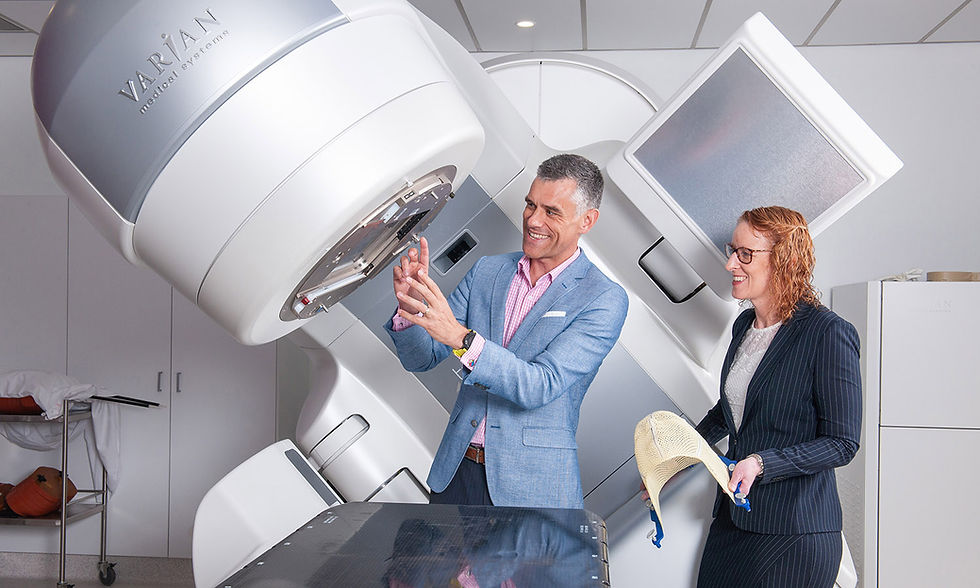Celebrating 30 Years of TROG Cancer Research
- intouch Magazine
- Feb 3, 2020
- 10 min read

Susan Goode understands all too well the benefits that flow from advances in cancer treatments. Not only did she care for her mother-in-law during her battle with the insidious disease, but Susan also heads up the Newcastle organisation considered a global leader in the field of cancer research – TROG (the Trans-Tasman Radiation Oncology Group).
Since 1989 TROG Cancer Research has been successfully improving the outcomes of cancer patients via radiotherapy-focused research and is now one of the largest clinical trial groups in Australia and New Zealand.
Working collaboratively with more than 70 hospitals and cancer treatment centres, as well as universities and the broader community around the world, TROG’s life-changing research has helped advance the way many cancers are treated across the globe.
“Our mission is to conduct world-class radiation therapy research to improve the outcomes and quality of life of people affected by cancer,” Susan said.
“In 1989, seven visionary radiation oncologists from radiation therapy centres across Australia and New Zealand saw a need to collaborate and improve the outcomes and treatment for patients affected by cancer.
“This bold vision resulted in the formation of the Trans Tasman Radiation Oncology Group; a collaborative clinical trials group seeking to advance the study of cancers that could be treated with radiation therapy.
“It’s hard to believe 30 years have passed since then … we’ve come a long way from our humble beginnings and now have medical professionals approaching us from around the world with new ideas on how to use radiation therapy to improve quality of life and treatment of a specific cancer disease.
“By collaborating and bringing to life these concepts in a managed environment, we’ve been able to achieve great advancements in cancer patient care and outcomes that have changed the way patients are treated worldwide.”
While TROG itself is celebrating 30 years of cancer research, Susan is a much more recent addition to the team, having been appointed CEO of the not-for-profit organisation in August 2018.
However, her personal and professional interest in the field began well before she took on her current role.

“I had been working with the University of Newcastle in primary care research for seven years, focused on dementia and stroke when an opportunity arose to lead the University of Newcastle’s translational cancer research program,” Susan said.
“Having personal experience of caring for my mother-in-law during her cancer battle, I was keen to apply my medical research and management skills to the field of cancer research.
“I was then the Centre Manager for the Hunter Cancer Research Alliance for the next eight years, successfully coordinating a locally-based cancer research program involving laboratory research, clinical research and implementation/public health research.
“When the opportunity arose to come to work at TROG Cancer Research, I was very excited to be able to apply my skills and knowledge for the benefit of a national not-for-profit organisation.
“I’ve always been motivated to work in a role where I can benefit others and here at TROG Cancer Research, our research benefits trial participants, clinicians and health professionals, as well as the wider community.
“I was particularly motivated to conduct research into more effective radiation therapy treatments, as my mother-in-law had benefited from previous advances in radiation therapy clinical trials through her treatment using stereotactic radiation therapy. Without these advances discovered through TROG trials she, and many other cancer patients, would not have access to this safe and more effective treatment.
“Our focus (at TROG) is to improve radiation therapy treatments for cancer patients using cutting-edge technology and techniques; to improve quality of life and outcomes for all cancer patients worldwide; and to provide rural and regional patients affected by cancer with better access to services, while also facilitating opportunities to participate in clinical trials.
“The survival for many cancers has improved over the last few decades; however, there is still further research needed to discover more effective treatments for specific types of cancer.
“We know that one in two cancer patients will benefit from radiation therapy, so the research we conduct is vital.”
During the past 30 years, TROG Cancer Research has conducted more than 105 trials involving 14,600 patients across Australia, New Zealand and internationally.
This has included research into all cancer types including breast, lung, genitourinary (prostate, bladder and kidney), head and neck, skin, gastrointestinal (colorectal, pancreatic and stomach), gynaecological (cervical, endometrial), lymphoma and central nervous system as well as symptom control and palliative care.
“We have a great track record of completing trials with over 210 journal publications featuring TROG Cancer Research trials, ensuring that the academic and medical community are informed of the latest clinical research findings,” Susan said.
“Our trial results are also incorporated into clinical practice guidelines both in Australia and internationally. This ensures that the latest clinical research advancements are implemented in cancer treatment centres, and that future patients benefit from the findings of TROG trials.
“TROG Cancer Research has been instrumental in supporting and speeding up the safe and effective implementation of many new radiation oncology technologies, which are more targeted to the tumour and spare more healthy tissue.
“Over the past 30 years, TROG Cancer Research has supported the implementation of Intensity Modulated Radiation Therapy (IMRT), Image-Guided Radiation Therapy (IGRT) and Stereotactic Body Radiation Therapy (SBRT).

“The research conducted by TROG Cancer Research and our international collaborating partners has shown that radiation therapy cures cancer and is a safe and effective treatment option.”
Collaboration has been crucial to TROG’s success – and is also one of the critical elements that ensured the organisation stood out from its beginning.
“Collaboration is now common practice. However, when TROG Cancer Research was established over 30 years ago, it was not so common, and so TROG was a leader in this field,” Susan said.
“Even today, we continue to collaborate with hundreds of hospitals and cancer treatment centres around the world.
“TROG Cancer Research is in a unique position in that we focus on one treatment - radiation therapy – for all cancers. Having a broad remit to improve treatments for all types of cancer requires us to have multidisciplinary and cross-disciplinary collaborations.
“Our multidisciplinary membership consists of over 1,600 TROG members in the disciplines of radiation oncology, radiation therapy, medical physics, medical oncology, surgery, trial coordination, statistics, health economics and quality of life.
“We also work with other leading groups including the Royal Australian and New Zealand College of Radiologists, the Australasian Clinical Dosimetry Service, the International Atomic Energy Agency and the Global Harmonisation for Radiation Therapy Quality Assurance.
“In Australia, we collaborate with other cooperative trials groups including Breast Cancer Trials (BCT), the Australian and New Zealand Urological and Prostate Group (ANZUP), Australasian Lung Trials Group (ALTG), Australasian Gastro-intestinal Trials Group (AGITG) and the Australasian Radiopharmaceuticals Network (ARTNet).
“By working collaboratively with these groups, we can bring together clinical expertise and specialist research knowledge from across Australasia in a united effort to fight cancer globally.”
Radiation Oncologist and Associate Professor, Jarad Martin, says this spirit of collaboration allows TROG to effectively tap into the “world brain” to enhance outcomes for patients.
TROG Cancer Research trials have been run in more than 200 hospitals and cancer centres in urban hubs and regionally around the world, including Australia, New Zealand, United Kingdom, Asia, Canada, Europe and South America.
“There’s a real legacy from what TROG Cancer Research has achieved over 30 years. Their approach to clinical trials that focus on collaboration over competition is being emulated by other organisations,” Jarad said.
“They give opportunities to researchers by providing a vehicle to make their research possible. For me, that opportunity has transformed and improved the way a lot of people with prostate cancer are treated.
“TROG encourages and harnesses new ideas and brings people together virtually from around the world so we can tap into what I call the world brain to produce real results for patients.”
Jarad is a Newcastle-based Radiation Oncologist who subspecialises in the treatment of genitourinary and gastrointestinal cancers as well as benign conditions using radiation therapy.
He is also an Associate Professor at the University of Newcastle and Director of Research in the Department of Radiation Oncology at Calvary Mater Newcastle and has been involved with TROG for more than a decade.
“I was one of the early members of TROG Cancer Research, having been with the organisation for 13 years in different capacities,” Jarad said.
“I started off as a fairly novice clinical researcher when I first became involved with TROG Cancer Research in 2007, and my role has evolved over time. I’ve led several successful cancer clinical trials coordinated by TROG Cancer Research, and I now hold the position of Clinical Liaison Leader.
“My main research areas are in the technical aspects of prostate cancer radiation therapy, while my technical knowledge is well recognised in areas including intensity-modulated radiation therapy (IMRT), image-guided radiation therapy (IGRT) and stereotactic radiation therapy (SBRT).
“TROG Cancer Research provided the vehicle to get my first cancer trial off the ground, which has now transformed the way a lot of people with prostate cancer are treated.

“Today, I’ve had the opportunity to deliver a number of successful clinical trials and much of that has been thanks to the opportunities and support TROG Cancer Research provided to enable my ideas around radiation therapy treatment.”
Jarad has contributed to research in an approach that has improved options for patients with prostate cancer, with his findings now being used by medical facilities globally.
“I’ve led a few clinical trials through TROG Cancer Research and, as a highlight, found a radiation therapy treatment approach that has improved options for patients with prostate cancer,” he said.
“That trial’s findings are now being used by medical facilities globally and have resulted in a reduction of treatment time from eight weeks and 40 medical visits to just four weeks with five medical visits for prostate cancer patients.
“The new KM (knowledge management) technology approach, which usually persists of three components, namely people, process and technology, has also improved accuracy by enhancing cancer-targeting for prostate cancer patients undergoing radiation therapy treatment.
“Healthcare is a knowledge-driven process, and thus knowledge management and the tools to manage knowledge in the healthcare sector are gaining attention and popularity.”
Research is also driven by knowledge – and the willingness to share this knowledge freely among those involved in the sector is both its most significant challenge and greatest opportunity, according to Jarad.
“One of the greatest barriers to cancer research is that there are so many organisations out there now, working to find solutions, but doing so independently and even in competition with each other.”
“The future of cancer research should centre around collaboration across research groups – TROG Cancer Research was one of the first collaborative trial groups in Australia. Their philosophy of tapping into the world brain by bringing people together globally to collaborate on cancer clinical trials paves the way for improved cancer treatment options across the world.
“TROG Cancer Research is very innovative and forward-thinking in harnessing the potential of specialists from outside the ‘norm’ to contribute to the cancer research space and have also provided the mechanism for younger generations to bring their ideas into being.
“It’s vital that we don’t just have the same people working in cancer research, we need to ensure that we bring in new ideas and train the future generation of clinicians and researchers.
“Having a mechanism of new ideas, and ongoing review and renewal in treatment options is going to produce the best outcomes for patients.”
Those outcomes for patients have already greatly improved over the past three decades, as technological advances and a better understanding of tumour biology have improved the efficacy of radiation therapy, resulting in a better quality of life and treatment options.
Cancer rates overall have also improved considerably: in the 1980s, the cancer survival rate was less than 50 per cent, while today, the survival rate is as high as 90 per cent for some cancers.
However, Susan said there is still more work to be done to continue providing hope to people with all cancers through the potential of radiation therapy.
“Although our clinical trials have facilitated great advancements in the way that different cancers are treated and have improved the quality of life for patients, there’s still much to be done to continue to increase cure rates, minimise side effects and improve the patient experience,” she said.
“It’s an exciting time to be working in cancer research, with advances in technology and new treatment options available that involve combining drug treatments with radiation therapy to determine the best treatment for each patient.
“In Australia, there are several cancer treatment centres that are implementing new MRI Linac machines that will assist with real-time imaging and adapting plans while delivering radiation treatment to the patient - this represents an excellent opportunity to research how this advanced technology can be utilised to best benefit patients.
“Particle therapy treatment will also be available in Australia within the next few years. Currently, patients need to travel internationally to receive particle therapy treatment, so it will be a great opportunity for patients to be able to access this treatment option in Australia. TROG Cancer Research is already involved in the establishment of an Australian Particle Therapy Registry, and as particle therapy is made available as a treatment option, we will be conducting clinical research to ensure the treatments are safe and effective.
“Our efforts in clinical research are not just technology-based, we are also working with our nuclear medicine colleagues to determine how to use novel tracers for PET imaging to improve diagnostic applications, define radiation treatment volumes and monitor patient response to treatment.
“There is currently a large volume of drug treatments available for cancer patients; however, radiation therapy remains a primary localised treatment option. Going forward, our research will likely involve combining treatments such as immunotherapy with radiation therapy to determine the most effective treatment regimens for patients.
“Radiation therapy remains an important curative treatment option; however ongoing research is still needed to ensure we can progress the ways we use this advanced technology to outsmart the many strains of the disease and also enable patients to maintain their quality of life both during and after treatment.”

Funding for these research projects isn’t always easy to come by, with TROG reliant on both funding from the government and community donations to continue with its vital work.
“Delivering world-class cancer research is expensive, and there is a significant gap between the cost of our clinical trials and the government funding available to them,” Susan said.
“Our primary focus is to support clinical trials that are investigator-initiated and independent of industry. This means we work with our oncology clinicians in Australia, New Zealand and internationally to develop clinical research studies and then support these clinicians to secure research funding to conduct the clinical trial.
“A lot of our trials run for seven to 10 years as we need to gather follow-up information on the trial participants for several years after their treatment.
“We frequently spend months and even years, supporting our researchers to try and secure funding, typically through competitive grants, where success has been reported to be as low as 10-15 per cent. This means that many critical clinical questions can go unanswered.
“As a result, TROG Cancer Research relies on the support of the community to bring our vital research to life.”
To find out how you can donate, or learn more about the work of TROG Cancer Research, visit www.trog.com.au
Words: Michelle Meehan




















































